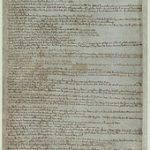Magna Carta and the rights of taxpayers in the 21st century. This year is the 800th anniversary of the Magna Carta. I’m particularly interested in the subject in the context of tax collection.
I sometimes think that people have a romanticized view of the Magna Carta. Let’s not forget that the original agreement was designed by a group of rebel barons to enforce their rights against an unjust king. It wasn’t a charter to help the common people; indeed the way I understand it, popular opinion at the time supported King John against the barons. And the charter itself was the subject of many challenges and changes.
However, the Magna Carta has always been regarded as establishing the principle that every individual was entitled to a fair system of justice and enshrines the right of people accused of committing a crime to a fair trial.
The barons’ real complaint was about the monarch’s rights and powers when it came to the collection of taxes.
Before Magan Carta, the monarch collected taxes as an absolute right – he didn’t have to seek agreement or consent from anybody else.
Magna Carta established the principle that the monarch was entitled to collect taxes from the people in order to run the country and defend the country. Of course, nowadays we have a constitutional monarchy and decisions about tax are made by the elected government. But the same principle should apply – that there is, in effect, a contract between the government and the people whereby the government agrees to uphold the rights of the individual in return for the payment of taxes.
And it’s this issue of the taxes that concerns me.
Following recent changes to court rules, HMRC is no longer liable to pay the costs of those who appeal against an HMRC decision and win at the Tribunal or the courts. One of the UK’s leading tax barristers recently told me that he and his colleagues are seeing more and more situations where HMRC issue dubious rulings, particularly to SMEs, who have limited access to funds to go through the appeals process. 
And it’s not just the cost of appealing a decision. It’s the timescale and the disruption to the business’s trading activities that can cause real problems. Suppose HMRC has issued an assessment for under-declared VAT on sales. HMRC take up to 45 days to review their original decision, which they uphold. You then have to appeal to the Tribunal and the timescale for getting to the Tribunal is around six months. You appeal to the Tribunal to hear the appeal without payment of the disputed tax on hardship grounds, but HMRC disagree, so you have to pay the VAT before the Tribunal hearing. Paying the VAT means that you have to delay paying suppliers and employees.
Even if you win at the Tribunal, there is a very good chance that HMRC will appeal the Tribunal’s decision.. Going to the High Court means more time and more cost and more disruption.
If you’ve managed to get this far, you’ll probably have incurred thousands of pounds in professional costs, never mind the disruption to the business, while HMRC are issue additional assessments for VAT “underdeclared” on subsequent VAT returns, so the business is closer and closer to insolvency. And it’s at this point that many business owners simply can’t go on. Their debtors are taking legal action for outstanding payments and they’ve had to make redundancies among their staff because of lack of funds.
In our criminal justice system, everyone accused of a crime is entitled to a defence which is funded by the taxpayer.
So why is it acceptable for a taxpayer to be placed at the mercy of HMRC?
HMRC have always had the power and authority to issue assessments for VAT that they believe is under-declared, but their lack of accountability when it comes to meeting the costs of taxpayers when HMRC’s assessments are WRONG seems to be a huge misuse of public power.
Of course, tax collection in the thirteenth century was a lot less sophisticated and less civilized. But I can’t see much difference between a visit from the tax collector demanding tax 800 years and the actions of HMRC now that they can demand VAT from taxpayers with no liability for costs if the assessment is incorrect.
The barons made Kind John agree to their demands 800 in the thirteenth century. Maybe it’s time for 21st century taxpayers to demand that the government redresses the balance of power between the government’s tax collectors and the taxpayers.
Marie
June 2015.
